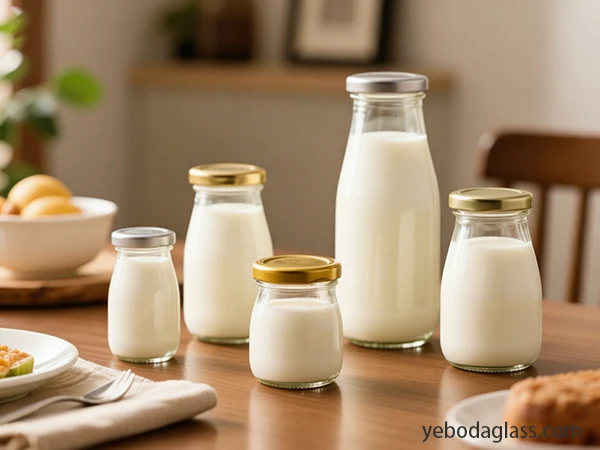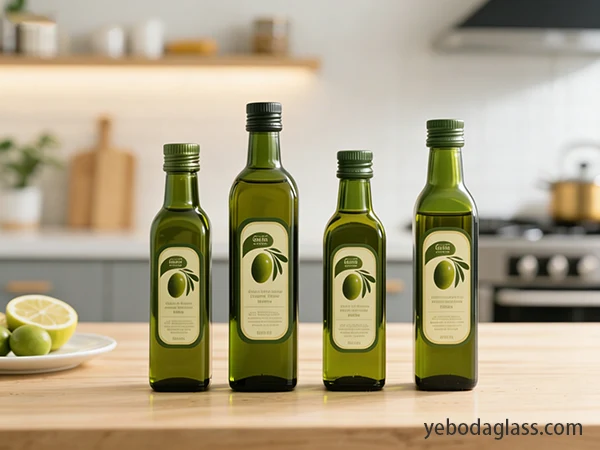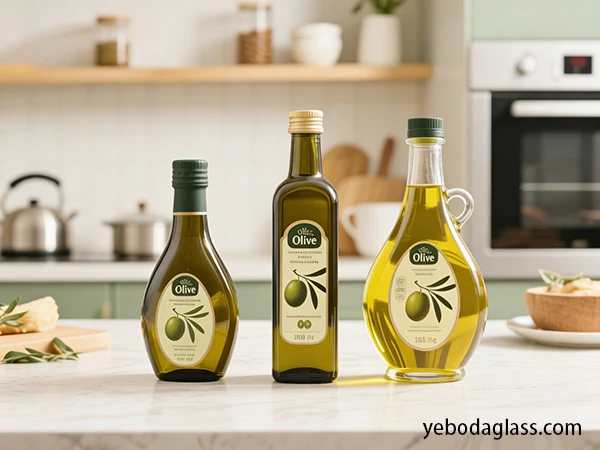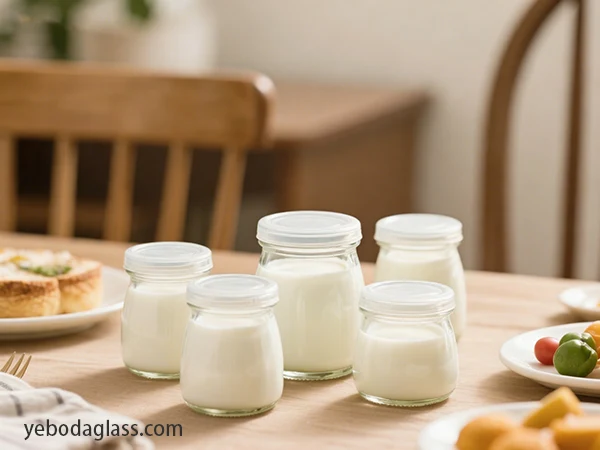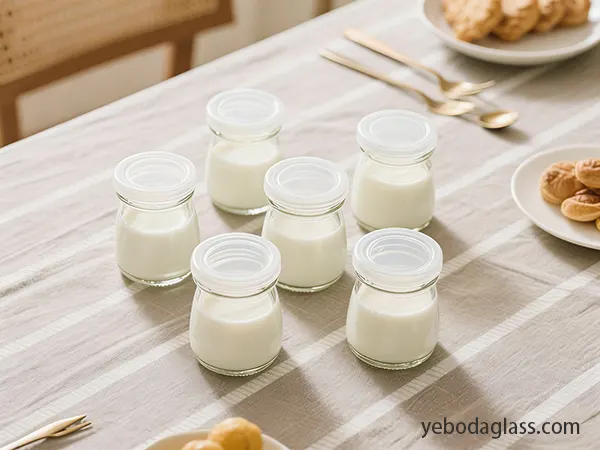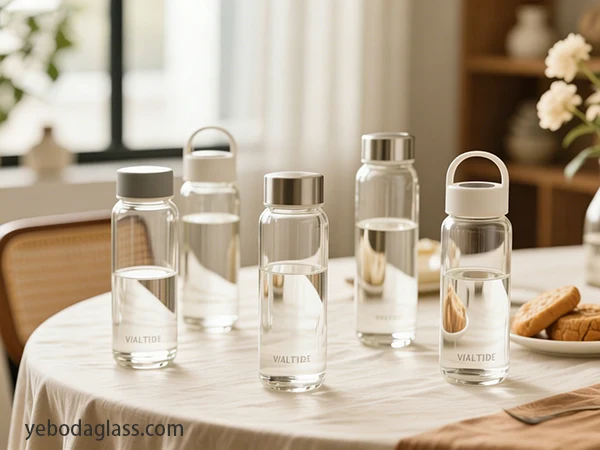Úvod
Objednávání velkoobchodních skleněných lahví na vodu je pro firmy strategickým krokem. Tento proces však s sebou nese potenciální úskalí. Tato zpráva popisuje běžné chyby a provede vás procesem získávání velkoobchodních skleněných lahví na vodu pro úspěšný výsledek.
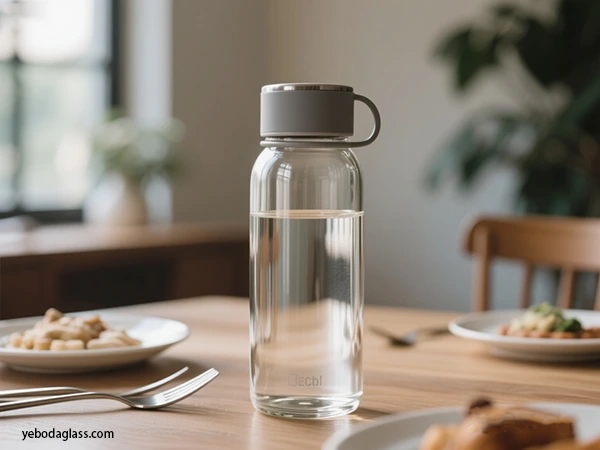
Definování rozsahu a požadavků projektu
Jasný rozsah je pro hromadné skleněná láhev na vodu objednávky. Přehlédnutí tohoto vede k problémům. Podrobně si rozeberte každý aspekt:
- Objem a kapacita: Uveďte přesný objem nebo kapacitu (např. 200 ml až několik litrů).
- Výběr materiálu: Borosilikátové sklo nabízí vynikající odolnost vůči tepelným šokům; sodnovápenaté sklo je běžnější a cenově výhodnější. Ujistěte se, že sklo neobsahuje olovo ani BPA.
- Rozměry a tvar: Definujte požadovaný tvar, který ovlivní estetiku a výrobní náklady.
Hmotnost a tloušťka: Specifikujte pro odolnost a vnímanou kvalitu. Rovnoměrná tloušťka zabraňuje vzniku bodů namáhání. - Typy uzávěrů: Možnosti zahrnují kovové, skleněné, bambusové nebo houpací střechy. Zajistěte bezpečné a nepropustné utěsnění.
- Zamýšlené použití: Ovlivňuje výběr materiálů a designu (např. neperlivá voda, perlivé nápoje).
Design a estetika: Vizuální přitažlivost posiluje hodnotu značky. Sladte ji s identitou vaší značky. - Branding a dekorace: Požadavky na detailní tisk (loga, barvy). Techniky zahrnují sítotisk, obtisky, leptání, gravírování, ražbu nebo reliéfní tisk.
- Kvalita a trvanlivost: Sklo musí být jednotné, odolné vůči praskání a deformaci. Lahve by měly odolávat opotřebení.
Pečlivé definování požadavků minimalizuje nedorozumění. Yeboda zajišťuje, že velkoobjemové skleněné lahve na vodu přesně odpovídají vaší vizi.
Prověřování dodavatelů a pečlivá péče
Nedostatečné prověření dodavatele je závažná chyba. Výběr špatného výrobce vede ke kompromisům v kvalitě a ztrátám. Je nutná intenzivní práce.
- Předběžné hodnocení: spolehlivost, kapacita, kontrola kvality (ISO 9001), hodnocení morálních praktik a finanční stability.
- Ověřování tvrzení: Zařiďte si certifikát žádosti, prohlídku místa a kontaktní údaje.
- Osvědčení: Viz normy ISO 9001, ISO 14001 a certifikát pro materiály přicházející do styku s potravinami.
- Audit: Proveďte audit funkcí a postupů na místě nebo virtuální audit.
- Kontrola referencí: Sbírejte zpětnou vazbu od stávajících zákazníků.
- Inspekce třetí stranou: Před odesláním zvažte nezávislé posouzení.
- Komunikační varovný signál: Pozor na vyhýbavé nebo nekompatibilní dodavatele.
- Regionální nápady: Přizpůsobte si čekání podle lokality.
- Finanční stabilita: Zhodnoťte finanční zdraví výrobce.
- Systém řízení kvality: Zkontrolujte inspekční postupy, testy a míru závad.
- Etické získávání zdrojů: Vyhodnoťte pracovní normy a dopad na životní prostředí.
- Ochrana duševního vlastnictví: Požádejte o NDA a zvažte registraci průmyslového vzoru.
- Incoterms: Pochopte odpovědnosti za přepravu a celní odbavení.
Pracující veterinář snižuje rizika. Přísný výběr Yebody splňuje kvalitativní a morální standardy partnerů.
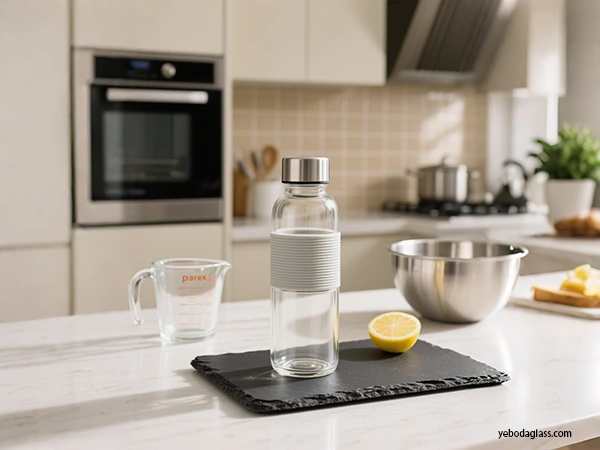
Normy kvality a bezpečnosti materiálů
Kvalita a bezpečnost skla jsou pro velkoobchodní skleněné lahve na vodu prvořadé.
- Druhy skla: Borosilikát nabízí lepší tepelnou odolnost; sodnovápenatý je běžnější, ale méně odolný vůči teplotním změnám.
- Bezpečnost a shoda: Sklo je ze své podstaty bez BPA. Zajistěte shodu s předpisy FDA a LFGB pro styk s potravinami. Dodržujte přísné limity pro těžké kovy (např. limity FDA pro olovo 4 ppm).
- Recyklované sklo (střepy): Ekologicky prospěšné, snižuje spotřebu surovin a energie. Recyklované sklo si zachovává netoxické vlastnosti.
- Vady skleněných lahví: Dávejte pozor na semínka, puchýře, provazce, kameny, praskliny a nerovnoměrnou tloušťku. Kritické vady mohou způsobit skleněné lahve nebezpečný.
- Zkušební postupy: Zkoušky shody zahrnují chemickou odolnost, mechanické vlastnosti a tepelné vlastnosti. Důležité jsou také zkoušky adheze nátěrů.
Upřednostňování kvality materiálů je nedílnou součástí. Yeboda zajišťuje, aby všechny materiály splňovaly nebo překračovaly průmyslové bezpečnostní a kvalitativní standardy.
Design, přizpůsobení a přesnost brandingu
Převod designových konceptů do hmatatelných velkoobjemových skleněných lahví vyžaduje přesnost.
- Věrnost designu: Zajistěte přesný převod tvaru a rozměrů. Složité tvary zvyšují náklady na formu.
- Techniky tisku a brandingu: Mezi oblíbené metody patří sítotisk, UV tisk, tisk obtisků, laserové gravírování a pískování.
- Příprava uměleckých děl: Poskytněte vektorové soubory s vysokým rozlišením (AI, EPS).
- Sladění barev: Přesné sladění barev Pantone je klíčové pro konzistenci značky.
- Výrobní tolerance: Pochopte inherentní tolerance ve výrobě skla. Definujte přijatelné rozsahy.
- Ražba a ražení: Integrujte branding přímo do skla pro prvotřídní a trvalé řešení.
- Zakázkové formy: Unikátní tvary vyžadují zakázkové formy, což představuje značnou počáteční investici.
- Předúprava: U některých metod tisku může být nutné předběžné vytvrzení povrchu, aby se zajistila přilnavost inkoustu.
Přesnost v designu a brandingu je prvořadá. Yeboda zajišťuje, aby specifikace designu byly splněny s přesností.
Balení, logistika a zmírňování škod
Nedostatečné balení a logistika velkoobjemového skla způsobují poruchy a zpoždění u lahví na vodu.
- Nejlepší postupy pro balení: Použijte metodu „krabice v krabici“ s dostatečným polstrováním (2–3 palce). Zaměstnejte nové dvou- nebo třístěnné vlnité krabice. Lepší ochranu poskytují na míru řezané pěnové nebo tvarované vložky. Eliminujte prázdný prostor.
- Doprava a logistika: Vybírejte spolehlivé kurýrní služby. Jasně označte balíky jako „KŘEHKÉ“. Zajistěte si dostatečné pojištění balíků. Seznamte se s celními předpisy. U citlivého zboží zvažte regulaci teploty.
- Technologie pro zmírnění škod: Využívejte senzory internetu věcí pro monitorování v reálném čase. Zajistěte, aby obaly splňovaly standardy ISTA.
Efektivní balení a logistika jsou klíčové. Yeboda upřednostňuje robustní balení a spolupracuje s důvěryhodnými logistickými partnery.
Smlouva se zřizovatelem a zajištění kvality
Komplexní smlouva chrání vaše zájmy a zajišťuje kvalitu velkoobchodní skleněné lahve na vodu.
- Základní konstruktivní prvky: rozsah prací, specifikace produktů, standardy kvality, ceny, platební podmínky, distribuční harmonogram, balení, ochrana duševního vlastnictví, soukromí, záruka, ukončení smlouvy a řešení sporů.
- Sekce zajištění kvality (QA): Výrobce musí mít silný systém zajištění kvality (např. ISO 9001). Musí zavést specifikace, inspekční procesy, úrovně AQL a zkušební protokoly surovin. Aplikovat systém sledovatelnosti.
- Předlodní inspekce: Důkladně zkontrolujte rozměry, bezpečnost, funkčnost, estetiku, množství a balení. Zvažte kontroly třetí stranou.
Jsou vyžadovány dobře vypracované smlouvy a protokoly o zajištění kvality. Yeboda klade důraz na transparentní dohody a striktní zajištění kvality.
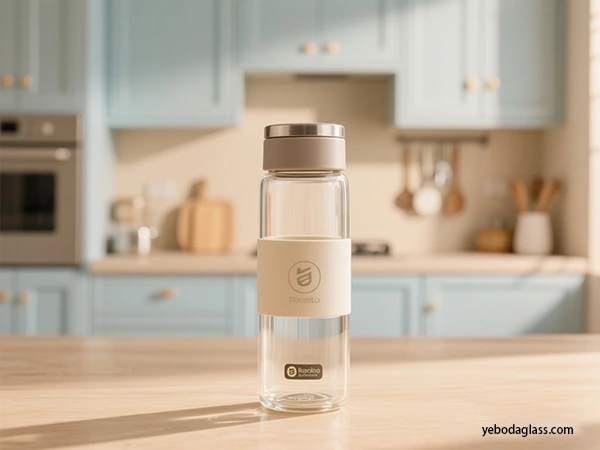
Řízení nákladů a optimalizace hodnoty
Vyvážení rozpočtu s kvalitou u velkoobchodních objednávek skleněných lahví na vodu je klíčové.
- Rozklad nákladů: Cenu ovlivňují náklady na materiál, složitost designu, tisk, objem, práce, umístění a balení.
- Skryté náklady: Mějte na paměti skladování, problémy s kvalitou, poplatky za dodržování předpisů a nestabilitu trhu.
Strategie konverzace: prozkoumejte ceny, identifikujte mnoho dodavatelů a definujte si rozpočet. Využijte konkurenci, mluvte o slovech i mimo hodnotu a zvažte dlouhodobé dohody. Promluvte si o platebních podmínkách a minimálních objednávkách. - Adaptace pro cenu: Lahve na míru posilují identitu značky a poskytují marketingové výhody. Sledujte návratnost investic do prvků na míru.
Náklady na adaptaci vyžadují strategickou interakci. Yeboda nabízí konkurenceschopné ceny a transparentní cenové struktury.
Alternativní výrobní postupy a materiály
Hledání inovací může vést k úsporám nákladů a jedinečným vlastnostem velkoobjemových skleněných lahví na vodu.
- Pokročilé technologie tavení: Technologie elektrických a hybridních pecí snižují emise CO2.
Chytrá výroba: Automatizace a internet věcí zvyšují efektivitu a přesnost. - 3D tisk: Usnadňuje přizpůsobení designu a snižuje plýtvání.
- Odlehčení: Snižuje náklady a zlepšuje udržitelnost.
- Recyklované sklo (střepy): Zvyšuje využití střepů z důvodu úspory nákladů a stability.
- Alternativní materiály: Objevují se polymery podobné sklu, biologicky odbouratelné sklo a papírové/vláknité lahve.
- Recyklace mobilního skla: Řezání zlepšuje dostupnost.
- Vakuově asistované procedury: Snižte energii tavení.
Yeboda se těmto pokrokům vyrovnává a nabízí nejmodernější řešení.
Stabilita a environmentální myšlenky
Stabilita je důležitým profesionálním imperativem pro velkoobjemové skleněné lahve na vodu.
- Recyklace skla: 100% recyklovatelné bez ztráty kvality skla je ve skutečnosti kulatý materiál. Recyklace snižuje spotřebu energie a znečištění.
- Odlehčení: Šetří zdroje a snižuje emise z dopravy.
- Recyklovaný obsah: Maximalizace využití střepů je primární strategií.
- Energetická účinnost: Výrobci zavádějí energeticky úsporné postupy.
- Snižování odpadu: Efektivní procesy a technologie minimalizují odpad.
- Udržitelnost balení: Používejte minimální, recyklovatelné nebo biologicky rozložitelné obaly.
- Systémy vratných kaucí (DRS) a EPR: Politiky zvyšují míru recyklace.
Upřednostňování udržitelnosti je v souladu s hodnotami spotřebitelů. Společnost Yeboda se zavázala nabízet udržitelná řešení pro velkoobchodní skleněné lahve na vodu. Řešením těchto oblastí si firmy zajišťují úspěšné nákupy velkoobchodních skleněných lahví na vodu. Odborné znalosti společnosti Yeboda zajišťují kvalitu, bezpečnost a spokojenost zákazníků.

